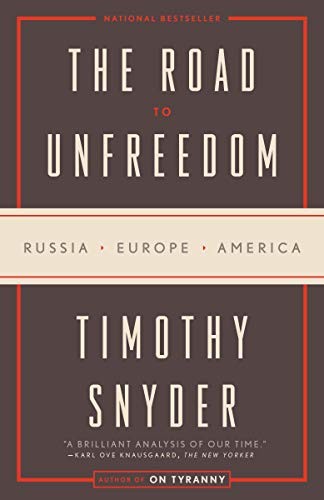Review of 'The Road to Unfreedom: Russia, Europe, America' on 'Goodreads'
5 stars
This book makes the case that many or most of the declines in openness and freedom over the last three decades in Western Europe and in the United States can be traced by a consistent effort by Vladimir Putin's Russia to spread strife to other nations which are seen as perpetual enemies. The author goes back to the first half of the twentieth century where a man I'd never heard of before, Ivan Alexandrovich Ilyin, put together the right-wing counterpart of the Russian Communist philosophies. Ilyin died in the 1950s but was brought back in the 1990s as someone who explained the misfortunes experienced by that country as a kind of contagion by the decadent and evil west which was determined to frustrate the realization of a united Eurasian empire inspired by the kingdom of Kievan Rus in the early Middle Ages centered. The rise of the class of oligarchs …
This book makes the case that many or most of the declines in openness and freedom over the last three decades in Western Europe and in the United States can be traced by a consistent effort by Vladimir Putin's Russia to spread strife to other nations which are seen as perpetual enemies. The author goes back to the first half of the twentieth century where a man I'd never heard of before, Ivan Alexandrovich Ilyin, put together the right-wing counterpart of the Russian Communist philosophies. Ilyin died in the 1950s but was brought back in the 1990s as someone who explained the misfortunes experienced by that country as a kind of contagion by the decadent and evil west which was determined to frustrate the realization of a united Eurasian empire inspired by the kingdom of Kievan Rus in the early Middle Ages centered. The rise of the class of oligarchs found themes in this philosophy which suited the kinds of things they were doing to enhance their personal wealth, much of it revolving around a narrative of endless struggle with outside nations which parallels the class struggle emphasized by the left.
The author then focuses on the years between 2010 and 2016 when Putin had consolidated his power as lifetime ruler and has gathered other oligarchical families in Russia and outside. The invasion of Ukraine is part military operation, part cyberwar, and a good deal psyops to the population of Russia. The presentation is not scholarly and there are no guides to primary sources here, so the careful reader would have to do a good deal of fact-checking on their own to verify the dozens or hundreds of incidents covered. There are a few names which recur over and over as fellow travelers with fascistic tendencies hoping to emulate the successes in their own governments. Towards the end of this section come the more or less direct attacks against the political systems of Poland, Germany, France, the United Kingdom, and the United States. I got the impression that they must have been pleased with the amount of success they have had beyond their wildest dreams in foisting a kleptocratic structure modeled on the Russian oligarchy on America as punishment for our attempts to meddle in their affairs over the past century.
It is a horror story for a person who believes in the old myths about liberal democracy and about its inevitable spread among all nations. It made me angry and outraged that this whole scheme played out so perfectly to Putin's advantage and still somehow left him as something other than an utter pariah in public opinion. Of course the other world leaders do not have the freedom to shun such a dangerous character, and of course there are thousands of Ukrainians who know how the actions on the ground and the embrace of alternative facts came so close to dismembering their entire country, and yet it doesn't seem like there's an enormous reservoir of loathing among Western European and North American citizens at what he has orchestrated over all this time. There have been dangerous strongmen in the past which weren't greeted with a collective shrug. There have been sanctions, but beyond that, it seems like there has been no way to register the kind of revulsion these kinds of authoritarian moves cause in people who still believe in Enlightenment ideals.
I listened to the audiobook version of this and found it maybe even more gripping than it would have been in print. This is a case where the voice of the author add something to the experience of the work; it makes it easier to hear the alarm bells he's ringing, in my opinion. I found it an absorbing work that scared me out of my wits that I would recommend to anyone who would want to be shaken in the same way.


